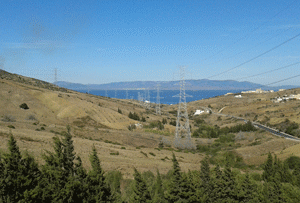 The European Union's Green Deal identifies climate change and environmental degradation as an existential threat to Europe and the World. Considering the Union's heavy dependency on fossil fuel supplies, access to renewable energies is a strategic priority for which transnational cooperations maybe critical. EU regulations already provide legal frameworks for Trans-European electricity supply networks. Their extension to neighboring EU countries would be of mutual benefit. By addressing security of supply through renewable energies, far-reaching economic returns could be accomplished.
The European Union's Green Deal identifies climate change and environmental degradation as an existential threat to Europe and the World. Considering the Union's heavy dependency on fossil fuel supplies, access to renewable energies is a strategic priority for which transnational cooperations maybe critical. EU regulations already provide legal frameworks for Trans-European electricity supply networks. Their extension to neighboring EU countries would be of mutual benefit. By addressing security of supply through renewable energies, far-reaching economic returns could be accomplished.
Several EU directives, programs and incentives are aimed at diversifying, enhancing and optimizing the Union's energy security of supply. Financial guaranties can be obtained for such projects that are similar to natural gas pipelines, which created productive economic linkage between partners.
The German-Russian natural gas tube business built at the end of the Cold War set a constructive example for that matter. Today, wind energy goes way beyond this model in transferring a more inclusive sustainable energy industry. This is something that the Russian gas example -which has since shown its limits- did not achieve. As energy security, sustainability, and the safeguarding of the environment represent global issues; cooperation with North Africa states are to be encouraged. This would open new collaborative possibilities enabling the region to integrate local manufacturing industries and capitalize on their outstanding renewable energy potentials.
Due to the exceptional nature of the trade winds, the development of a domestic wind industry could gradually feed into a lasting sustainable energy supply network. Opening the Euro-Mediterranean energy market to renewable electricity exchanges, generates a dynamic with much-needed industrial employments. This represents a significant stability asset for a region threatened by social uprisings due to limited inclusive development prospects.
 This policy option was mentioned in the Union for the Mediterranean Solar Plan, which seeks to establish a common strategic policy framework on both sides of the Mediterranean. Through projects such as Sahara Wind, the Mediterranean Solar Plan to provided a new dimension to the European Union's Neighborhood policy.
This policy option was mentioned in the Union for the Mediterranean Solar Plan, which seeks to establish a common strategic policy framework on both sides of the Mediterranean. Through projects such as Sahara Wind, the Mediterranean Solar Plan to provided a new dimension to the European Union's Neighborhood policy.
The European Union's Barcelona process MEDA and now EUROMED programs already funded the existing 700MW undersea cable interconnection linking both continents through Spain and Morocco. This electrical interconnection, run by bilateral agreements, has been doubled to 1400 MW. While studies for an undersea link with Portugal are underway, further extension plans are also considered. At present time, only limited amounts of wind-electricity can be transferred. Due to its limited size and remoteness, the existing AC grid which connects North African load centers to the Sahara coastline extends too far. This prevents power flows from occurring on an effective scale. Sidestepping transmission and intermittency challenges by feeding broader electricity markets, the Sahara Wind Project’s HVDC line opens the access to a significant wind resource.



